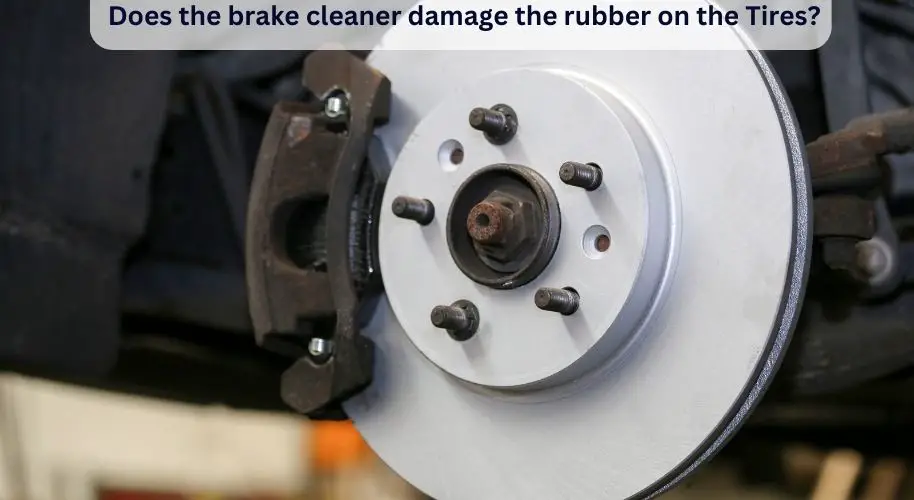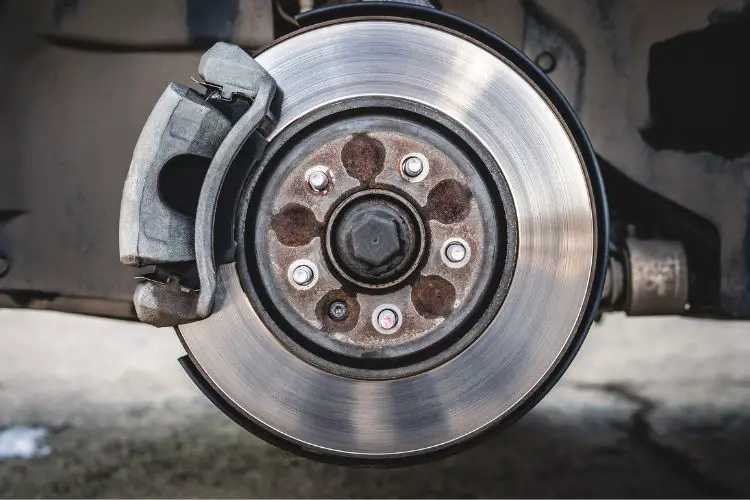Last Updated on March 14, 2023 by Henry T. Hawkins
Summary: Brake cleaners are made with solvents like acetone and methylene chloride, which are both very harsh chemicals that can break down the rubber in tires. Repeated exposure to these chemicals will eventually cause the rubber to deteriorate and lead to premature tire failure.
If you need to clean your tires, it is best to use a mild soap and water solution or a specialized tire cleaning product. These products are designed specifically for cleaning tires and won’t harm the rubber as brake cleaners will.
If you’ve ever wondered if brake cleaner can damage the rubber on your car tires, then this blog post is for you. After a ride on the road, your car will surely pick up road grime, dirt, oil spills, etc., which require regular cleaning.
We’ll explore if a brake cleaner will be a good solution to use in this case, what it does to rubber if it has any harmful effects, and how you can protect your car from any potential harm.
We’ll also discuss how people use brake cleaners in their cars and why it might not be a good idea. So, read on to find out if a brake cleaner is worth the risk!

Does the brake cleaner damage the rubber on the Tires?
Yes, the brake cleaner damages the rubber on the tires of a car if used too repeatedly! Brake cleaners have very strong chemicals that can be very effective at removing dirt and debris from your brakes.
However, they can also cause damage to your tires if used too often. The chemicals in brake cleaners can break down the rubber on your tires, leading to premature wearing out.
To avoid this, you can follow this process:
- Limit the use of brake cleaners and use alternative cleaning methods.
- If you do use brake fluid, make sure to rinse the area with plenty of water to ensure that no residue remains.
- Regularly check your tires for signs of wear and tear and replace them when needed.
Taking these steps can help you maintain your tires and avoid any damage caused by brake cleaners.
However, I suggest you use mild soap and water to clean your brakes. I use this Chemical Guys Wheel Brush. The bristles of this brush are long enough to get into the spokes to remove dust and brake dust.
Also read: Will a bike rack damage my car
How does brake cleaner destroy rubber on tires?

There are a number of ways brake cleaners can destroy rubber on tires. Such as-
1. Wear down the rubber on the tires
As mentioned above, brake cleaners contain chemicals that can degrade and deteriorate the rubber, damaging tires and flats/blowouts permanently. This is especially true when combined with heat or friction, which can speed up the process even more.
2. Separate Tread
Using brake cleaners can lead to tread separation. It means the tread detaches from the tire. This can be caused by these polar solvents detaching the adhesives from brake linings. If it occurs, you must immediately replace your tires as they are no longer safe.
3. Shorten the tire’s life expectancy
Brake cleaners will reduce the life span of your tires. This is due to the wear and tear that it causes. The chemicals within brake cleaners can erode the rubber and make it more susceptible to damage.
This will cause your tires to wear down faster, resulting in less performance and a shorter lifespan. In addition, it can also lead to a decrease in air pressure due to the chemical evaporating the air inside the tire.
4. May lead to a blowout
Using brake cleaners may result in blowouts, which is a serious safety issue. This can occur due to the polar solvents weakening the rubber and tires and creating tiny openings along your tire’s sidewalls.
If you notice any abnormalities when using brake cleaners, immediately stop using them and have your tires checked by a professional.
5. Can be combustible
Brake cleaners are highly combustible and can easily catch fire if exposed to an open flame or spark. The chemicals within them create a volatile mixture that can cause explosions and fires.
So, you should use them with caution. Always follow directions on the label and keep away from heat/fire sources.
Also read: Can I mix power steering fluid
Watch this video on How Not To Use Brake Cleaner
What can I use to clean brakes that won’t damage the rubber on tires?
Non-chlorinated brake cleaners are my first choice to clean brakes that won’t damage the rubber on tires. They are not as widely used, but they pose less risk to your tires due to the lack of harsh chemicals that can degrade the rubber. This makes them a better choice for protecting your tires from damage.
Another option is to use hot soapy water. However, you should make sure not to get any soap or water on the brake pads or rotors as this can cause corrosion and reduce stopping power.
On the other hand, you can also use compressed air to blow away any dust and debris from your brakes.
No matter which method you choose, it’s always important to take proper safety precautions such as wearing protective eyewear and gloves while working with chemicals or compressed air.
Additionally, be sure to check your brakes regularly for signs of wear and tear and clean them if necessary.
Is non-chlorinated brake cleaner safe on rubber?
Yes, non-chlorinated brake cleaner is generally considered safe to use on rubber surfaces. Non-chlorinated brake cleaners contain aliphatic or aromatic chemicals and polar solvents, including ethanol, isopropanol, methanol, and acetone.
However, you should immediately clean off any residue after using non-chlorinated brake cleaner on rubber surfaces, as it can still cause damage if left on for too long.
FAQs
Carb cleaning involves using a non-corrosive and non-flammable cleaner that does not harm or degrade any plastic or rubber pieces on the carburetor. This means that you can safely use carb cleaning to clean your carburetor without worrying about damaging the rubber components.
However, you should note that certain carb cleaners may be rough on small engine plastics and rubber, so it’s best to take off any plastic linkages before using them.
Additionally, some cleaners may dissolve gas that has turned into varnish, which could potentially damage some rubber parts. To avoid this, make sure to use a cleaner specifically designed for carburetors with plastic jets.
No. Brake cleaner will not damage rubber O rings. However, you should take caution when using brake cleaner on rubber as some types of rubber may be more susceptible to the effects of the chemicals in brake cleaners.
Brake cleaners are designed to clean and degrease brakes and other automotive parts without causing any damage. Most brake cleaners advise against spraying the solution directly onto rubber as it can strip away wax protectants that shield it from the harmful effects of ozone. It is best to use a cloth or brush to apply the cleaner onto rubber components.
In addition, certain types of brake cleaners contain harsh chemicals that can cause swelling in buna-n which can lead to leaks, as well as pull oils out of the rubber which can cause them to crack and fail sooner than expected.
Therefore, it is important to read labels carefully before using any type of brake cleaner on rubber components.
Brake cleaners can damage rubber or plastic surfaces and should not be used on carpeting. Additionally, you shouldn’t use brake cleaner on anything that’s plastic, rubber, paint, chrome or welded metal parts, as it can release toxic gases when heated to high temperatures.
Most importantly, you should take safety warnings seriously when using brake cleaner and read the instructions carefully before using.
Wrapping Up
Thank you for reading this article on does brake cleaner damage rubber on tyres. We hope that you know how to use the brake cleaner carefully so it does not damage the rubber.
If you have any more questions about this topic, please comment below. Also, if you think this blog post can help others who do not know the harmful side of brake cleaners, you can share it to reach them and can take part in sharing good deeds! Thank you!

